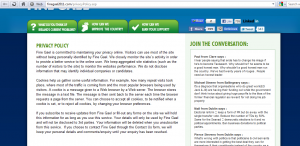This blog post is basically the text of an audioboo I recorded at 9:30 this morning which has disappeared into the ether ne’er to be found.
Fine Gael have launched their “Twolicy Page”. I won’t comment on the hideous neologistic portmanteau that is “Twolicy”, other than to say it that seems to have been dreamed up by a pat.
What strikes me about the “Twolicy” page is that it is yet another import of an American election campaign tool into Irish Politics, particularly with the concept of the “E-Canvasser”. Fine Gael dynamically tell us that the E-Canvasser (perhaps some distant cousin of the “Cyber Reporter” who has emerged as the colour piece of the day on certain Irish current affairs shows?) will
“knock on all cyber doors by delving into the depths of Facebook, Twitter, Youtube, Flickr and more! Through the simple medium of sending e-mails, facebooking and tweeting messages of support for Fine Gael you can pledge your commitment to fixing the Irish economy.”
This is a strategy which exists to some extent in Irish politics even today. Many of the letters to Madame Editor are crafted examples of “Astroturfing” – something that appears to be a grass roots movement but is not. I first became aware of the concept back in 2002 when I spotted the Republican Party in the US running “GOPTeamLeader.com” (which, thanks to the interweb waybackmachine I can bring to you in hideous technicolour). Basically the party recruits a team of volunteers who are tasked with sending “on-message” communications to the media (which in 2001 was the newspapers, TV, and radio). In return, the GOP provided a set of reward points (like Green Shield Stamps) which could be saved up and exchanged for rewards such as barbecues, autographed photographs of the Reichsfuerher candidate, and (if memory serves me correctly, an RV.
Fine Gael liken this to door to door canvassing. However that analogy does not hold true because the Internet is not a housing estate or public street. Drop a bus load of eager canvassers on my door step and they will be able to
- See my house
- See my neighbours’ houses
They will not need to ask my neighbour to throw leaflets over my back wall. They will see the big sign in my hall window warning them of the fate that will befall them should they ring the bell and seek discourse (“Warning – political nut lives here”). And most of them are clued in enough to know that the “no canvassers” sticker in the window means that stuffing my letter box with bumph will just be providing stimulus to the paper recycling industry.
The Internet is different. Social media is different. Whoring out your personal contact list to a political party is different. And because it is different, we find ourselves to an extent in uncharted territory with regard to the Data Protection implications of Social Media driven Astroturfing.
Right now I have a contact list of 413 followers on Twitter for my personal account. I have a second twitter account that is for my business. People who follow me know (from my profile and what I tweet about) that I’m a Data nut and I do data protection and information quality training so content about those things will pop up in my timeline. People who follow me also know I’m a bit of a politics geek and enjoy holding our leaders to account. But I try and keep my business tweeting separate from my personal tweeting. And when I whore myself out too much on Twitter, I get friendly DMs from people or I get unfollowed.
This is because the contact details of my friends are information I have gathered for domestic purposes. As such the Data Protection Acts don’t apply. If I was to sign up to be an e-Canvasser (and I can’t get the image of a canvasser handing out bags of yokes out of my head) we would then face the question of whether I was still processing that data for Domestic use or whether I had become a Data Processor working on behalf of Fine Gael, a Data Controller.
The key question would seem to be how much control Fine Gael are exerting over the content and communication from their e-Canvasser Astroturfers, and whether they are offering any form of reward or incentive for people to encourage them to pimp out their domestic contact lists.
If Fine Gael are simply being “passive” and are relying on individuals to act on content that is made available, then there is probably no substantial issue here. It is a case of a person finding content on the web that they think would be of interest to their personal network. We do this every day. It is the way the social web works. Of course, that then raises the question of why they would need you to sign up to their team for this purpose… surely the type of political nut blogger who would retweet or repost their bumph would do so anyway without having to be officially flagged as an “E-Canvasser”?
If Fine Gael are being “neutral” and are simply flagging content to people who have signed up and asking them to do what they see fit with it, then this too is probably OK. The analogy would be the charity that Tweets out a fundraising message and asks their followers to retweet it to send the fundraising virally. The charity has not asked you to commit to being an active fundraiser on their behalf.
However, if Fine Gael are specifying specific content into specific constituencies at specific times and are exercising control over the content of the messages that are being sent, then we are into a potentially problematic area.
The e-Canvasser would not on the Fine Gael payroll. But they would be, in effect, processing personal data on behalf of Fine Gael as part of the “Fine Gael Team”. It would be interesting to find out how much direct “editorial” control that FG are placing on the Facebook Statuses that people are “donating” (and where does this fit in SIPO? What is the monetary value of a person’s Facebook status?) or the emails to “family and friends”. This is personal data that was given to them for a domestic purpose, not for the purposes of canvassing for Fine Gael. Once they commence a “active” canvassing then the use of the data has likely changed from “domestic” to political and the Data Protection Acts would apply. If Fine Gael are directing the timing of messages, the content of messages, and/or the audiences for messages then the e-Canvasser is being directed in their processing by the Data Controller, Fine Gael. And, as Data Controller, Fine Gael would need to ensure that there was clarity about the new political use of the personal data and a clear mechanism for the Data Subject (the canvasser’s family and friends) to opt-out would need to be in place – and FG would, of necessity, need to push this responsibility down to the Canvasser.
Otherwise, FG would not have obtained the data fairly for the purposes of electoral canvassing. It would be no different than if they had asked the local GAA club to email all their members to let them know about Fine Gael’s new policy on tax relief on sliotars and faceguards for hurlers. And that is the kind of thing that the Data Protection Commissioner has already warned against.
Things become an order of magnitude more complicated if Fine Gael are running any kind of incentive scheme for e-Canvassers to drive up the publication of their AstroTurf message.
Of course, Fine Gael have probably thought this through and will have the necessary protocols in place to ensure that there is a mechanism for a Canvasser’s friends to opt out of receiving Fine Gael campaign materials by email, Facebook or Twitter. They have probably realised that people have the same reaction to junk mail on-line as they do at their door step and need to have the ability to put up an on-line “No Canvassers” sign.
Currently the only opt-out mechanism I can see is to unfriend people, unfollow them or block them. Which is exactly what I would do in the physical world if a friend of mine kept ramming leaflets and policy statements from a political party into my face.
Of course, in the absence of such an opt-out facility, Fine Gael (as Data Controller) and the e-Canvasser (as Data Processor) would need to be cautious of falling foul of SI526 2008 (the e-Privacy regulations) which carry a fine of €5000 per breach, capped at €50,000 for an individual. While Twitter and Facebook might not be mentioned in the legislation, email is in section 13(1).
b)Â A person shall not use or cause to be used any publicly available electronic communications service to send an unsolicited communication for the purpose of direct marketing by means of electronic mail, to a subscriber, who is a natural person, unless the person has been notified by that subscriber that for the time being he or she consents to the receipt of such a communication.Â
[edit to clarify some points raised by @tjmcintyre]
Now, the DPC has ruled in the past that there is an exemption covering the Direct Mail (including email and texting)
carried out in the course of political activities by a political party or its members, or by a candidate for election to, or a holder of, elective political office
Question: is the eCanvasser the political party (I would argue yes if FG are exerting sufficient control that they would become a Data Controller)? In which case, the processing is possibly covered.
But I would suggest that this exemption assumes that the email or tweet would be clearly coming from Xyz@partyname.ie or an individual clearly identifying themselves as a member of the party or publicly known to be a candidate for election or an elected official. Getting an email from “yourbestmate@gmail.com’ telling you to go and look at Fine Gael policies, where that email has been sent on the instruction of and under the Control of the party or candidate would seem to me to fall outside the scope of issues already decided.
[/edit]
So, the upshot is that while physical world canvassers have to be careful of yappy dogs, cats that bite and political nuts who have hard questions, eCanvassers need to consider both the social acceptability and potential legality of pimping out their personal contact lists on behalf of a political party. Such tactics are de rigeur in the US. But the US does not operate with the same privacy legislation as Ireland, so ideas imported from overseas must be vetted properly to ensure that no Compliance risks arise.
I would be interested to see what the Data Protection Commissioner’s response to or advice on formal ecanvassing that places the data at arms length but creates a de facto Data Processor/Data Controller relationship would be, particularly if that relationship is not obvious to the recipient of the email or tweet. [update] Perhaps it would be sufficient for the emailer or tweeter to clearly flag that they are part of a formal eCanvassing team acting on behalf of and under the instruction of Fine Gael?[/update]
[update] But the issue of whether the change of use of the data from domestic to overtly political will, in my personal view, give rise to questions of whether the data has been obtained fairly for that new purpose, which is a point already clearly settled in the mind of the DPC.[/update]
Â
Â



